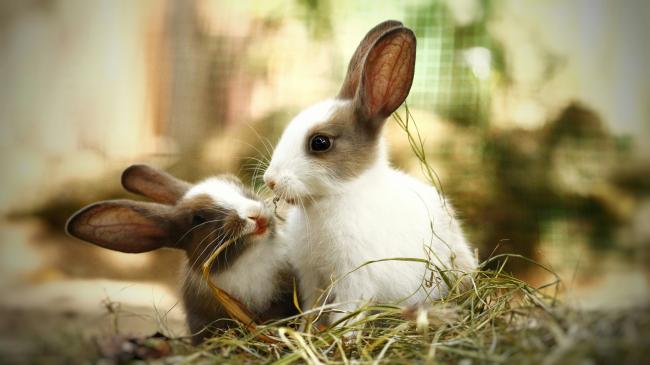Does you pet need an animal buddy?
Are you head-over-heels for pets? Do you consider your pet not just an animal, but a true member of the family? You're not alone—we totally get it!
Our pets receive abundant love from their owners and occasional pampering from friendly pet sitters. However, some may feel lonely or isolated. It is something to be aware of if you are out for the majority of the work day or extended periods of time.
Just like in humans, many pets benefit significantly from having a companion and by developing social connections. A companion pet can significantly increase your pets mental and physical health. They are also shown to go a long way to help combat loneliness, anxiety and depression in your pet and improve their long term outlook.
Here's a closer look at some especially adorable pet pairings that might inspire you to double the fun at home.
1. Rabbits
Rabbits are quintessential group animals and struggle with loneliness more than some other pets. Fortunately, caring for a second rabbit is not necessarily much more expensive or much more work than just one. They do, however, require ample space to ensure each rabbit can have some alone time when needed. A male and female pair is usually the best match, ensuring the male is neutered to prevent an unexpected bunny boom!

2. Parakeets
Parakeets thrive in the company of their feathered counterparts. Watching them interact is a true joy—they play and cuddle, providing endless entertainment. It's advisable not to house two females together as they can sometimes be territorial and prone to squabbling. A male and female pair, or two males, usually get along best.

3. Guinea Pigs
In the wild, guinea pigs are accustomed to living in groups, making it essential to keep at least two together in captivity. Monitor their interactions closely for any signs of aggression and provide additional space if necessary. A group of females or a mixed-gender group (with a neutered male) usually works well. Introducing a baby guinea pig to an older one often goes smoothly, with the older one helping to teach the younger essential social behaviours.

4. Rats
Rats are highly social creatures who prefer the company of another rat. Introductions should be gradual, allowing them time to become comfortable through sniffing and exploring each other's scents. Patience is key—give your rats plenty of time to adjust to their new living arrangement without rushing them.

5. Cats
While cats often appear independent and self-sufficient, they too can benefit from the companionship of another cat. Cats can groom, cuddle, and entertain each other, especially useful when humans aren't home. For kittens, adopting two of the same sex can prevent some territorial issues as they grow.

Encouraging Friendship Among Pets
Sometimes, pets don't get along immediately, but patience is crucial. Here are a few tips to help foster a harmonious relationship between new pet duos:
- Introduce them slowly: Always introduce new pets to each other gradually and in a controlled environment.
- Monitor their interactions: Keep a close eye on their interactions. Look for signs of stress or aggression and separate them if necessary.
- Consult a professional: If you’re unsure about how to proceed, don’t hesitate to seek advice from a shelter worker, breeder, or veterinarian. They can offer valuable insights and help make the transition as smooth as possible.
We Want to Hear from You!
Do you have any pet duos who are inseparable best friends? Or maybe you know of other pairings that we haven't mentioned? We'd love to see pictures and hear stories about your pet duos.
Pet companionship not only doubles the fun but also halves the burdens of our furry friends. Whether it’s rabbits, birds, guinea pigs, rats, or cats, a suitable buddy can make a world of difference in the life of your pet.
Need a Pet Sitter to look after your animal duo? Find a Pawshake Pet Sitter Today!






